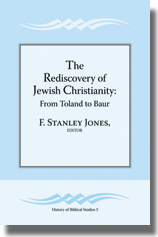
$36.00
This focused collection of essays by international scholars first uncovers the roots of the study of ancient Jewish Christianity in the Enlightenment in early eighteenth-century England, then explores why and how this rediscovery of Jewish Christianity set off the entire modern historical debate over Christian origins. Finally, it examines in detail how this critical impulse made its way to Germany, eventually to flourish in the nineteenth century under F. C. Baur and the Tübingen School. Included is a facsimile reproduction of John Toland’s seminal Nazarenus (1718), which launched the modern study of Jewish Christianity. The contributors are F. Stanley Jones, David Lincicum, Pierre Lurbe, Matt Jackson-McCabe, and Matti Myllykoski.
F. Stanley Jones is Professor in the Department of Religious Studies and Director of the Institute for the Study of Judaeo-Christian Origins at California State University, Long Beach. He has published widely on the subject of Jewish Christianity, including An Ancient Jewish Christian Source on the History of Christianity: Pseudo-Clementine "Recognitions" 1.27–71 (Scholars Press/Society of Biblical Literature) and Pseudoclementina Elchasaiticaque inter Judaeochristiana: Collected Studies (Peeters).
Click here for a printable publication sheet that you can put in your files or give to your librarian or bookstore.
Click here for the title page, table of contents, and preface.
“This volume is a fascinating exercise in the history of scholarship, made possible in part, as is acknowledged, by the availability on the internet of treatises long-forgotten by most recent scholarship. Yet by exposing in the ideological context these older battles over the origins of Christianity, and by demonstrating that those reconstructions associated most frequently with F. C. Baur did not in fact start with him, it enables contemporary discussion to engage with its precursors and perhaps thereby to recognize the pitfalls and prejudices which may stand in the way of more creative solutions.”
— Judith M. Lieu, Journal of Ecclesiastical History
